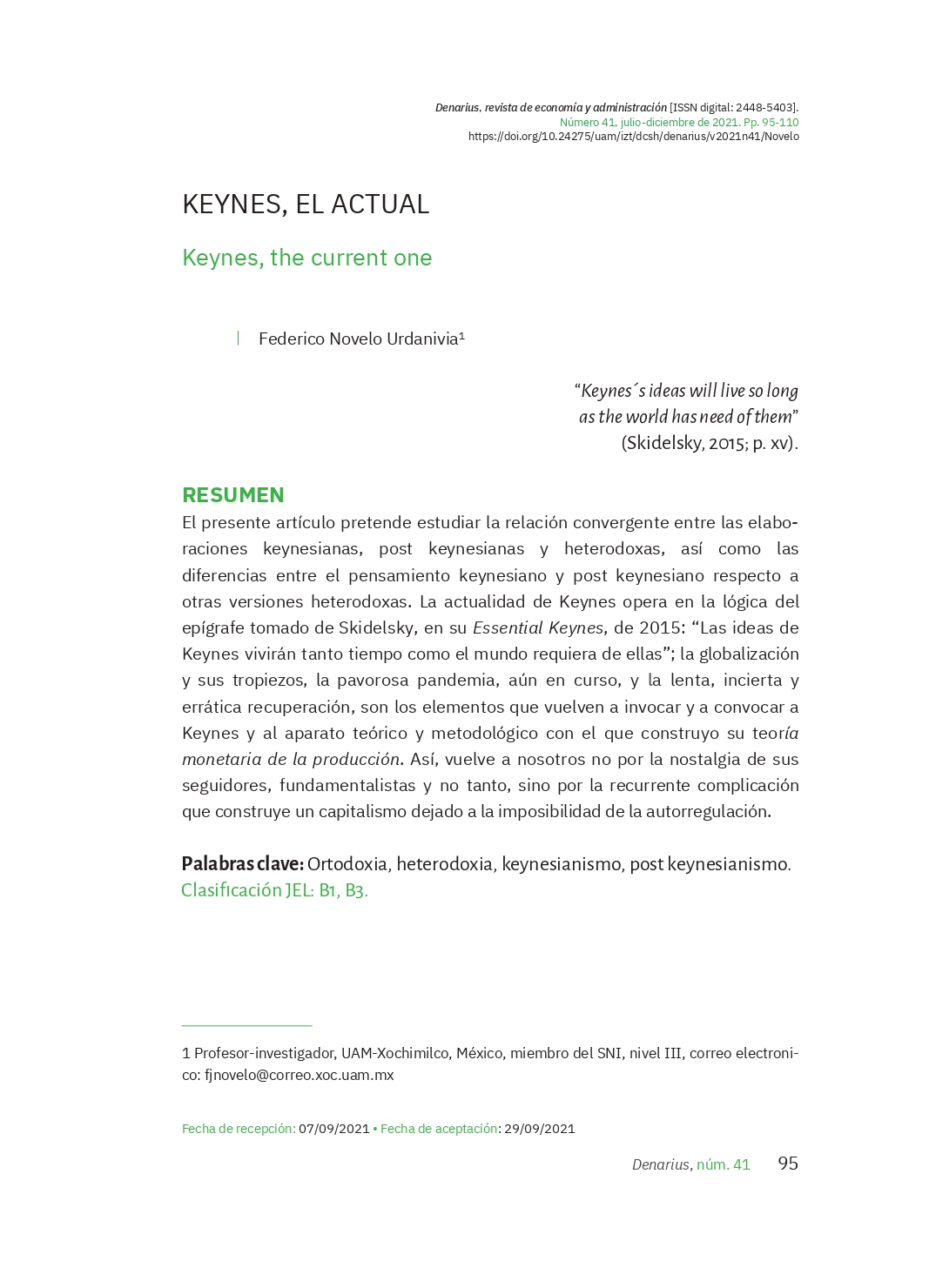Keynes, the current one
Abstract
This article emphasizes the study of the convergent relationship between Keynesian, post-Keynesian and heterodox elaborations, all taken into consideration with respect to other heterodox versions. The actuality of Keynes operates in the logic of the epigraph taken from Skidelsky, in his Essencial Keynes, of 2015: “Keynes’s ideas will live as long as the world requires of them”; globalization and its setbacks, the terrifying pandemic, still ongoing, and slowly, uncertain and erratic recovery, are the elements that once again invoke and summon Keynes and the theoretical and methodological apparatus with which he built his monetary economy of production. Thus, it returns to us not because of the nostalgia of his followers, fundamentalists and not so much, but because of the recurring complication that builds a capitalism left to the impossibility of self-regulation.
Downloads
References
Barnes, E. (2020), Mr. Keynes´Revolution (A Novel), Greyfire Publishing, USA.
Carter, Z. (2020), The Price of Peace, Random House, New York.
Chang, H. (2015), Economía para el 99% de la población, Debate, Argentina.
Crotty, J. (2021) Keynes Against Capitalism. His Economic Case for Liberal Socialism, Routledge, UK.
de Haan, P. (2016), From Keynes to Piketty. The Century that Shook Up Economics, Palgrave Macmillan, London.
Dimond, R. y Harald H. (2019), The Elgar Companion to John Maynard Keynes, Edward Elgar Publishing, UK.
Eichner, A. y Kregel, J. (1975), “An essay on post Keynesian theory: a new paradigm in economics”, Journal of Economic Literature, USA.
Galbraith, J. (1983), El dinero. De dónde vino/adónde fue, Orbis, Madrid.
Harrod, R. (1958), La vida de John Maynard Keynes, FCE, México.
Hein, E. y Lavoie, M. (2019), Post-Keynesian economics, en Dimand, Robert y Harald Hagemann (2019), The Elgar Companion To John Maynard Keynes, Edward Elgar Publishing, UK.
Hein, E. y Stockhammer, E. (2011), “A post Keynesian macroeconomic model on inflation, distribution and employment”, en E. Hein and E. Stockhammer (eds), A modern Guide to Keynesian Macroecnomic and Economic Policies, Cheltenham, UK.
Hicks, J. (1989 [1937]), “Keynes y los clásicos”, en Dinero, interés y salarios, FCE, México.
Keynes, J. (2015 [1937]), “The General Theory of Emploment”, en The Essential Keynes, Penguin, Random House, UK.
Keynes, J. (1926 [1988]), “Laborismo y liberalismo”, en Ensayos de Persuasión, Crítica, Grijalbo, Barcelona.
Keynes, J. (1958), Teoría General de la Ocupación, el Interés y el Dinero, FCE, México.
Kicillof, A. (2007), Fundamentos de la Teoría General. Las consecuencias teóricas de Lord Keynes, EUDEBA, Buenos Aires.
Kregel, J. (2015), “Economía monetaria de la producción y política monetaria”, en Economía Monetaria de la Producción. Dinero, Inestabilidad y Crisis, UNAM, México.
Krugman, P. (2012), ¡Acabad ya con esta crisis!, Crítica, Barcelona.
Lavoie, M. (2014), Post Keynesian Economics: New Foundations, Cheltenham, USA, Edward Elgar.
Marglin, S. (2021), Raising Keynes. A Twenty-First-Century General Theory. Harvard University Press, USA.
Minsky, H. (1987), Las razones de Keynes, FCE, México.
Robinson, J. (1976), “Carta abierta de un keynesiano a un marxista”, en Relevancia de la teoría económica, Ediciones Martínez Roca, S. A., Barcelona.
Schumpeter, J. (1983), Diez grandes economistas: de Marx a Keynes, Alianza Editorial, Madrid.
Skidelsky, R. (1999), El Mundo después del Comunismo. Una Polémica para Nuestro Tiempo, SMF/ Gernika, México.
Viner, J. (1936), “Mr. Keynes on the Causes of Unemployment”, Quarterly Journal of Economics, 51, noviembre.
Walsh, J. (2021), Investing with Keynes. How the World´s Greatest Economist Overturned Conventional Wisdom and Made a Fortune on the Stock Market, Pegasus Books, Ltd. New York.














